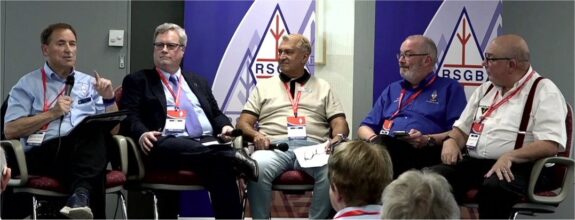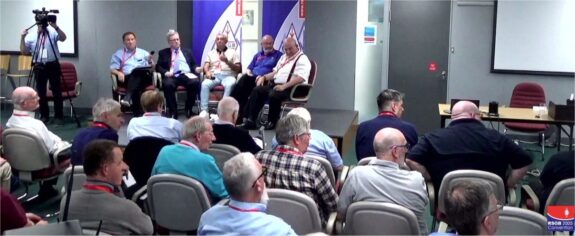One key session at the 2025 RSGB Convention was “How to encourage clubs to thrive” – a panel discussion aimed at clubs that may be struggling. The session was chaired by BBC Radio 4 ‘s Jim Lee G4AEH, and the panel consisted of the following clubs:
- Cray Valley Radio Society
- Bracknell Amateur Radio Club
- Mid Ulster Amateur Radio Club
- Thames Amateur Radio Group
Event link: rsgb.org/main/rsgb-convention-2025/rsgb-2025-convention-livestream/

We asked AI to review the discussion, and here’s AI’s report:

Key Discussion Themes from YouTube Chat
1. Community & Collaboration
-
Viewers loved the Men’s Shed and U3A partnerships; seen as “really great ideas about community groups.”
-
Some noted success linking clubs and Men’s/Women’s Sheds, and shared local experiences (e.g. Suffolk RED, Felixstowe club).
-
Calls for cross-club cooperation: invitations exchanged (e.g. Felixstowe inviting TARG to its military event).
2. Youth vs. Time-Rich Members
-
Guy Roberts: wanted ideas for attracting younger demographics.
-
GlassBoxMedia (Sarah 2E0ISJ): countered that time availability, not age, is the key factor — focus on people who can participate, not just “the young.”
-
Tim G5TM: suggested targeting 40–50-somethings returning post-family commitments.
-
Consensus: returning operators and mid-life entrants are an under-tapped audience.
3. Training and Practical Skills
-
Several hams stressed that online exams alone aren’t enough; clubs must provide hands-on mentoring.
-
Essex Ham Team: highlighted that “offering hands-on or show-and-tell nights is a definite win.”
-
GlassBoxMedia: reported success replacing “PowerPoint nights” with monthly kit-demo sessions and skills-sharing evenings.
4. Public Perception & Accessibility
-
The Ham Radio Junkie: praised clubs for welcoming newcomers at the RSGB National Radio Centre and helping lapsed hams renew callsigns.
-
BBC coverage and livestreaming (as cited by the panel) drew chat support — seen as raising visibility.
5. Online Media and Social Reach
-
Viewers credited lockdown-era YouTube and social posts with much of the hobby’s recent growth.
-
Essex Ham and others noted that clubs relying only on lectures or slides “seem to be the ones now struggling.”
6. Inclusivity and Safeguarding
-
Some agreed that working with under-18s is valuable but needs clear safeguarding (“full of other issues and risks”).
-
Others mentioned that clubs should also support parents and offer mixed-age entry points.


the clubs i hear of and see online as growing are generally the ones which partner with other spaces and community groups , E.G Maker groups, scouting etc
the clubs i see and hear not doing well are those who want to stay 100% traditional, CW / Voice only, no digital mode allowed and little or no social media
so moving with the times (social media / new digital modes etc ) and working with other community groups seems to be the key to getting people into a club
keeping them means the friendly welcoming atmosphere, interesting evenings (show and tell, elmering, club shack,) not just grumpy OAP men that live in the past